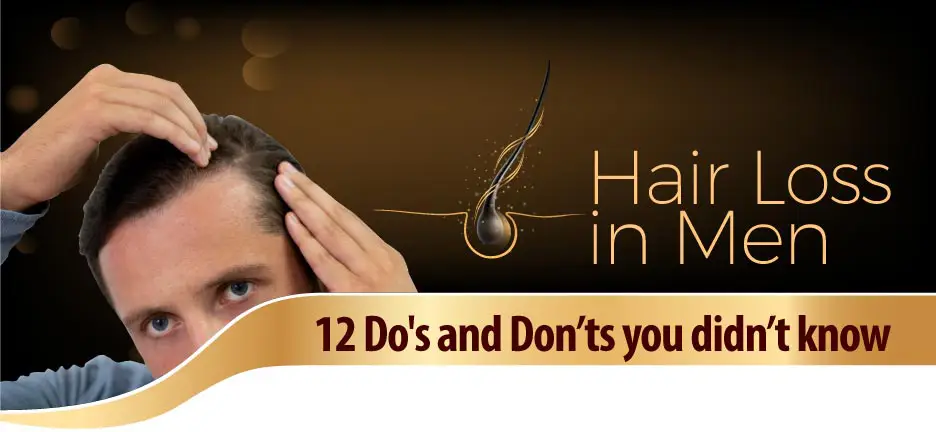
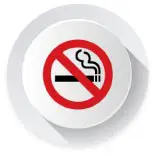

- iron-rich foods, including lean beef, beans, green leafy vegetables, iron-fortified grains, and eggs
- foods rich in omega-3 fatty acids, such salmon, mackerel, tuna, flax seeds, egg yolks, hemp seeds, and walnuts
- high-protein foods, like eggs, lean meats, and seafood Last but not least, make sure you’re drinking plenty of water.

Dermatologists say that vigorous grooming of your hair — such as following the old recommendation to brush it 100 strokes every night — can damage your hair and cause it to break off. If you excessively brush your hair and it appears thin or shaggy, try limiting how much you brush your hair. Often, the best way to improve the health of your hair is to leave it alone as much as possible.

Try using castor oil to moisturize your hair and get your blood flowing at the same time. Both may help you grow more and thicker hair.
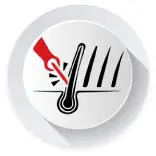
Sometimes, it can be difficult to determine why your hair is falling out — and therefore, how to treat or prevent hair loss. In addition to reviewing your medical history and asking about lifestyle factors that may be affecting the health of your hair, a dermatologist can perform a professional hair and scalp analysis to help determine the cause of your hair loss. Your dermatologist will carefully study your hair and scalp and may take a sample of your hair or a scalp biopsy to gather more information.

Hair doesn’t make the man. Remind yourself of everything else you have to offer. Or take care of things you can control, like staying in shape. It’s OK to look to others for support. And if you need a little inspiration, think of bald men or guys with shaved heads who ooze confidence. Consider yourself in good company.
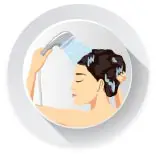
Most men don’t need to wash their hair every day. Too much shampoo or conditioner on a daily basis breaks down the natural structure of your hair. This doesn’t mean you skip showers, though. Wet and soak your hair in your daily shower, but don’t use product every time.

Do not using hair accessories that can cause hair breakage, such as hairpins, clips, and rubber bands

Avoid styling products that can damage and break the hair, such as blow-dryers set to a high heat, straightening irons, and curling irons

Limit the use of bleach, relaxers, and hair dyes

Avoid excess shampooing or brushing

When the hair is wet, avoiding brushing it or applying plastic or rubber hair ties, tight hairstyles, such as pigtails, cornrows, braids, and buns

Avoid hot oil treatments

Avoid chemicals used in perms and hair straightening treatments

Avoid hot curling
irons or straightening irons

Avoid bleaching
your hair
If you must use chemicals or bleach in your hair, seek help from a trained professional. Don’t try to do it yourself at home. Treating the hair as gently as possible can help preserve it and minimize the rate of hair loss. Constantly twisting, twirling, or pulling your hair tight can lead to hair loss.
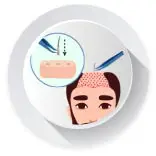
If it comes to it transplanting healthy hair, this can be a good long term solution and has shown excellent results. The surgical technique involves moving hair follicles from a hairier part of the body to where the hair is thinning or bald. The process can be costly, and you may need to do it a few times before it works. After 2 months, you’ll shed most of what the doctor moved, but new strands will grow back. It’ll start to look normal within 6 months.

Going through a rough time can sometimes lead to hair loss. Try to head it off by getting a better grip on your stress. Try techniques like meditation, deep breathing, guided imagery, relaxation exercises, or talking to a counsellor. Exercise is also a great option. These are all easy to learn and proven to help ease tension. Keep in mind, the best treatment for your hair loss depends on the cause. Talk to your doctor for guidance.

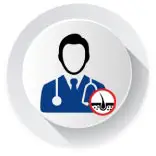
Hair loss is not necessarily a condition that affects a person’s overall health, but it can greatly impact their mental well-being and self-esteem. A person should see their doctor if they are concerned about hair loss, especially if they are taking supplements or have made dietary changes and are losing hair. A doctor may recommend seeing a dermatologist, who can conduct additional testing if necessary to determine appropriate treatments.









